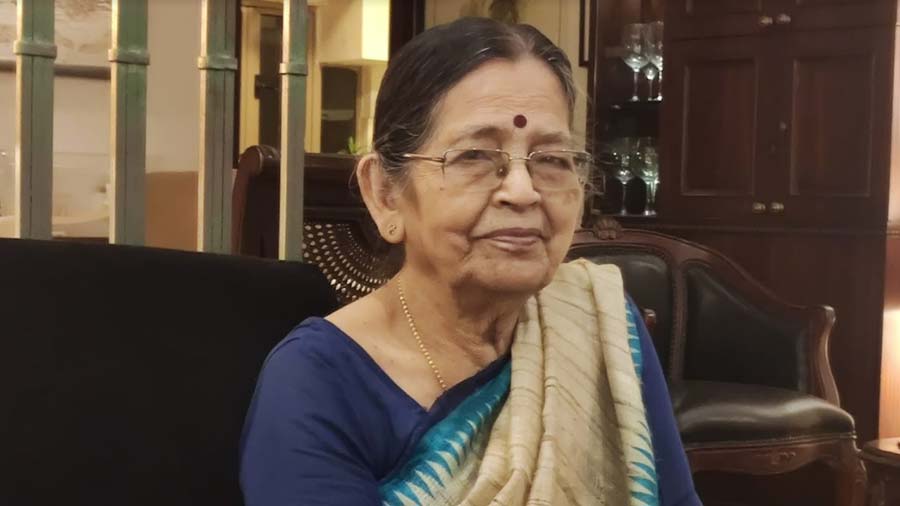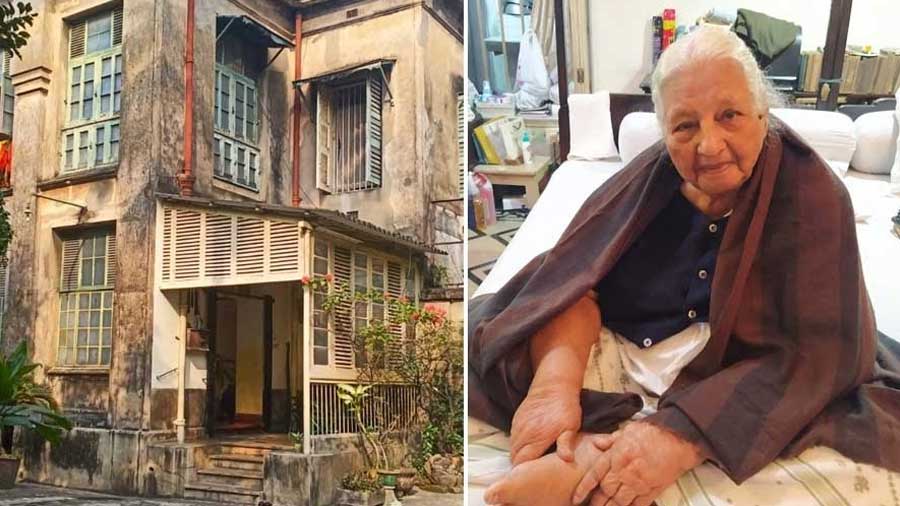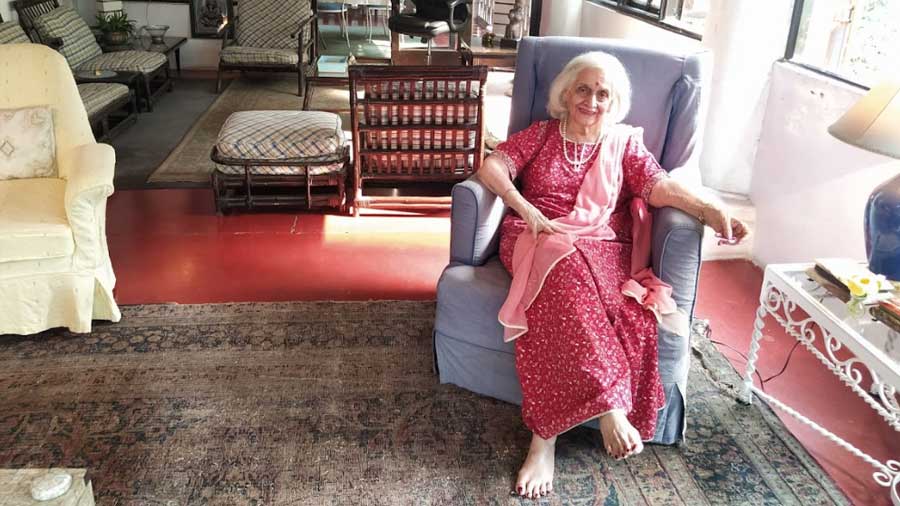Bela Bose is the co-founder of Calcutta Ekatma, an NGO which works towards the upliftment of underprivileged people in the rural areas of Kolkata. She also imparts vocational training, nutrition training, runs a play school for deprived children, and has opened an Adult Literacy Centre in Santiniketan.
So what? Well, Bela Bose will turn 90 next year!
Even now, there’s not a lot she wants to talk about, other than the work she’s steeped herself in for more than half a century. She retired as a Professor of English from Viharilal College but never quite gave up on the social work she’d started after getting involved with NSS (National Service Scheme) programmes early in her career. But if there’s anything she wants to talk about, it’s her father, who has been a great influence in her life.
Bela remembers her father as being an “out-and-out a Gandhi man. He only wore Khadi and we learnt from a very young age to never desire unnecessary luxuries,” she says. Later, Bela herself adopted a stance of great moderation while bringing up her children. “There were no excesses but we were allowed to do anything we wanted to do,” says her daughter Indrani, now a film producer.
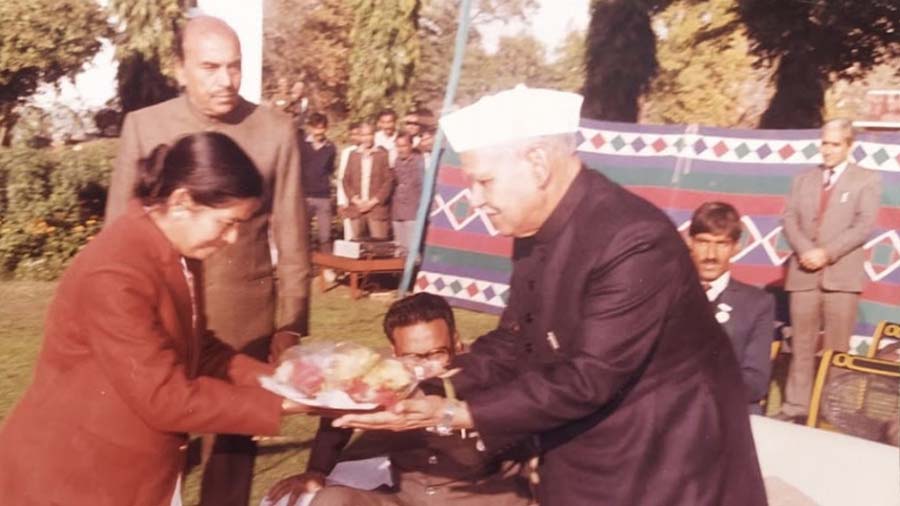
In 1989, Bela Bose presented the flower bouquet to the Vice President, Shankar Dayal Sharma, after the Beating of the Retreat at the Republic Day parade in Delhi. She was representing Bengal and was leading a team of four universities on that day
Bengal Famine: The sight of all those starving people taught me to never waste any food
Bela Bose née Bhattacharya, was born in Dhaka in 1933, moving to Kolkata when she was 11 years old, through the World War-induced blackouts. They were tumultuous years, with the Bengal Famine eclipsing life in Dhaka in 1943 and the Great Calcutta Killings looming ahead. “The sight of all those starving people taught me to never, ever waste any food in my life.” The war years were marked by a shortage of basic supplies such as paper. “I remember giving only oral exams since all the paper was being shipped to the armed forces,” said Bela. In Kolkata, the family moved to Chakraberia, a locality that Bela remembers being fiercely protected by the Sikhs during the violence that ensued in the aftermath of Direct Action Day (August 16, 1947). From her verandah, Bela watched truckloads of corpses being cleared away; she had mercifully avoided the sight of actual bloodshed.
Bela’s father was a freedom fighter, Kedareswar Bhattacharya, who was imprisoned in Mandalay Prison for seven years, detained under suspicion of various conspiracies. When he was a student of Sanskrit College in Kolkata, the principal informed him that they might be forced to rusticate him for all the adverse police reports he had gathered. Bhattacharya promptly left college and, ignoring his family’s pleas that he train to become a barrister in England, fled to Burma to avoid the Bengal police. There he immersed himself immediately in the political movement, which eventually led to the imprisonment from which he was released in 1937. But Bhattacharya was known to bring about a certain joie de vivre even in prison, keeping the British officers entertained with his violin and his songs. Which is why, when one of the medical officers from Mandalay Prison found him sick in Calcutta Medical College, he called for an external doctor immediately, saying, “this gentleman is a freedom fighter, we must save his life.”
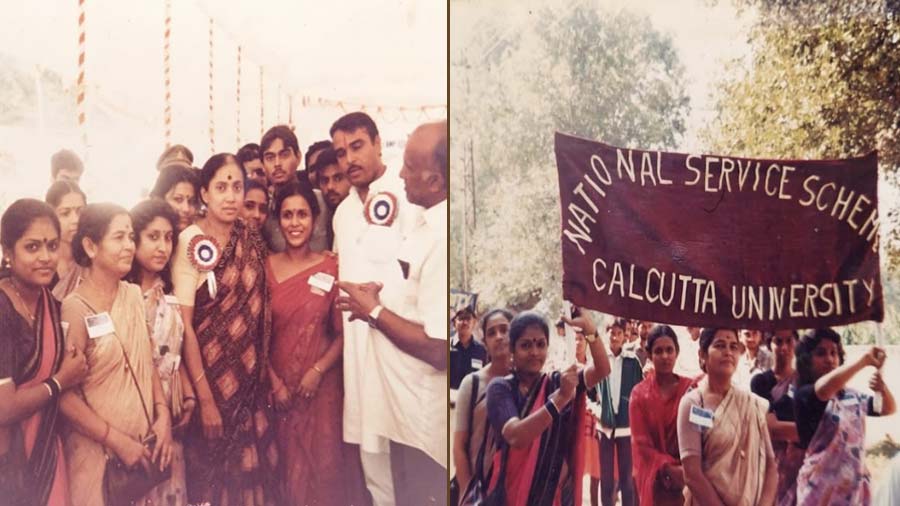
(L) Bela Bose (second from left) meets Margaret Alva in the 1980s, with NSS students of Calcutta University in Allahabad ; (R) The NSS volunteers make a banner out of a shawl and paper cuttings at the National Integration Camp in Allahabad
Amartya Sen: Presidency College classmate who was always sitting around in Coffee House
By this time, Bela herself was enrolled in Beltala Girls’ High School and was part of Soumendranath Tagore’s baithak, learning to sing under his tutelage at his Elgin Road address. At the time of Independence, she took her cue from her father and believed that communal violence could only end with Partition, even hoping that it would be as temporary as the 1905 partition of Bengal. It took years to come around to the fact that her hometown was now in a different country.
Bela graduated from Presidency College in 1953, with a degree in English Literature. Amongst her classmates was Nobel Laureate Amartya Sen, who Bela remembers as being a “good sportsman” who was “always sitting around in Coffee House. He never attended his Pass subjects… we certainly never saw him in Bangla class!”
Bela’s father died before she could finish her Master’s course and she started working, instead, at the Audit office on Mission Row Extension. Unbeknownst to her, he had told his wife that he had found a certain Shyamaprasad Bose to be a suitable husband for his daughter, even if he was almost a decade older than her. Bose had served in the Indian Navy and had joined the naval mutiny during the Second World War, thereby losing his job and becoming a businessman. No wonder then he was a man after her father’s heart!
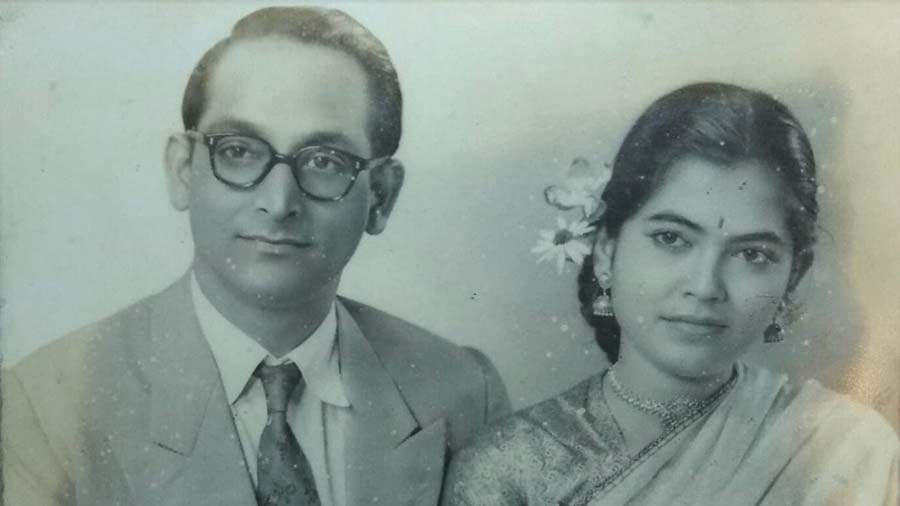
Bela and Shyamaprasad Bose, in a wedding announcement in Illustrated Weekly, 1957. In 1960, they moved to Lake Gardens – a South Kolkata neighbourhood that was still in the making then. ‘I remember the kancha rasta, kancha drain and water from the tube well. A very different Lake Gardens from present day,’ laughs Bela
Bela did get around to completing her Master’s degree, after she ran into an old professor who convinced her to enrol again. She gave her last exam two days before her son was born. It was not for nothing that she landed a job as lecturer at Sarojini Naidu College for Women. She also joined the Association for Social Health in India and began to assist in the rehabilitation of trafficked women, becoming involved in their stories. “I realised then what I didn’t know before, that many of them didn’t even know what they were getting into. Some of them were running away from their husbands and then found themselves embroiled in a situation they couldn’t get out of,” she said. This drew her to a cause that would last a lifetime – the upliftment of underprivileged women.
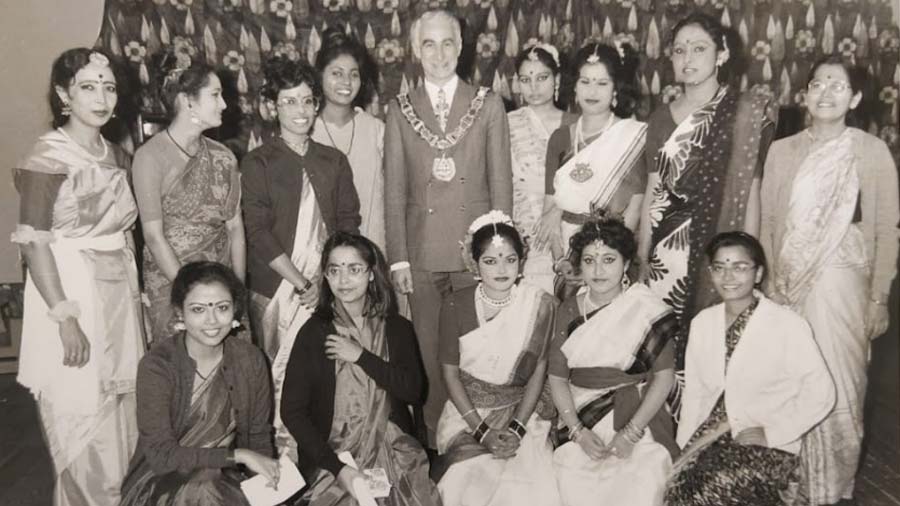
In 1988, Bela Bose led a group of her students to England on a youth exchange programme with the Commonwealth Youth Council, invited by the Buckinghamshire county council who also sent a group to India. ‘We staged Tagore’s dance drama, ‘Chandalika’, to demonstrate that we don’t believe in untouchability,’ said Bela (first from the right, standing)
Play school for children: They had no one to look after them
When Bela joined Viharilal College for Home and Social Science as a Professor of English, she also learnt a fair bit about nutrition at the camps and workshops that were held in the college. The government had now introduced the NSS in colleges, for students who wanted to be involved in social welfare activities. Bela became the Chief Officer of the NSS at Viharilal College. Her experience helped her to demonstrate to disadvantaged women how they could make the most of what they had, by not overcooking their food or wasting any part of a vegetable.
Bela Bose co-founded Calcutta Ekatma in 1991. Its rehabilitation efforts are focused in the 24 Parganas as well as Midnapore and North Bengal. “We set up a play school for children between the ages of two and five, who had no one to look after them. They kept getting into fatal accidents, so we set up the school, offered them free tiffin in the school and lined them up to recite poetry, learn to count and perform physical drills,” says Bela.
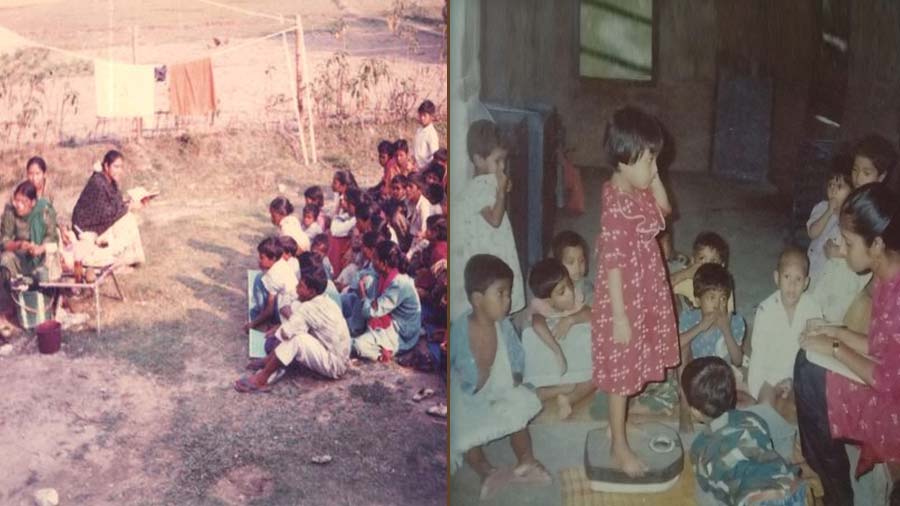
(Left) Student volunteers demonstrate low-cost nutritious food for tribals, during a project at Naxalbari; (right) A child stands on a weighing scale during a health checkup for children at Taldi, South 24 Parganas calcuttaekatma.org
Adult literacy: They learn words from sentences they’re familiar with
In Thakurpukur Cancer Hospital, the mothers of the children afflicted by leukaemia are allowed to live on the premises. Ekatma runs a vocational training camp inside the hospital, where the beautician course has taken off most effectively. They have also opened an Adult Literacy Centre in Santiniketan. “It’s very different from teaching children,” says Bela, who trained for the course herself at All India Council for Mass Education at Patuatola Lane in North Kolkata. “Adults learn the alphabets via words they already know and they learn words from sentences they’re familiar with. It takes them about a year to gain some amount of proficiency in writing what they need to be able to in life,” she explains.
Passport officer: Aapnar number ki 2441139?!
Even now, Bela Bose is rarely at home, running from demonstrations to training. When she’s home in Lake Gardens, she’s usually working on translating books from English to Bengali or vice versa. She is currently working on the second volume of a Bengali book on organic farming, originally penned by a professor of Visva-Bharati University. She’s also inspired to maintain her own little kitchen garden on the terrace, which often yields tomatoes, okra and bitter gourd.So much to do and so little time? She only smiles serenely, in response, her bustling days leaving her entirely unruffled.But what happened when the Anjan Dutt song made “Bela Bose” a household name? Well, she was at the passport office, where the officer turned over the papers and asked, “Aapnar number ki 2441139 (Is your phone number 2441139)?!”
